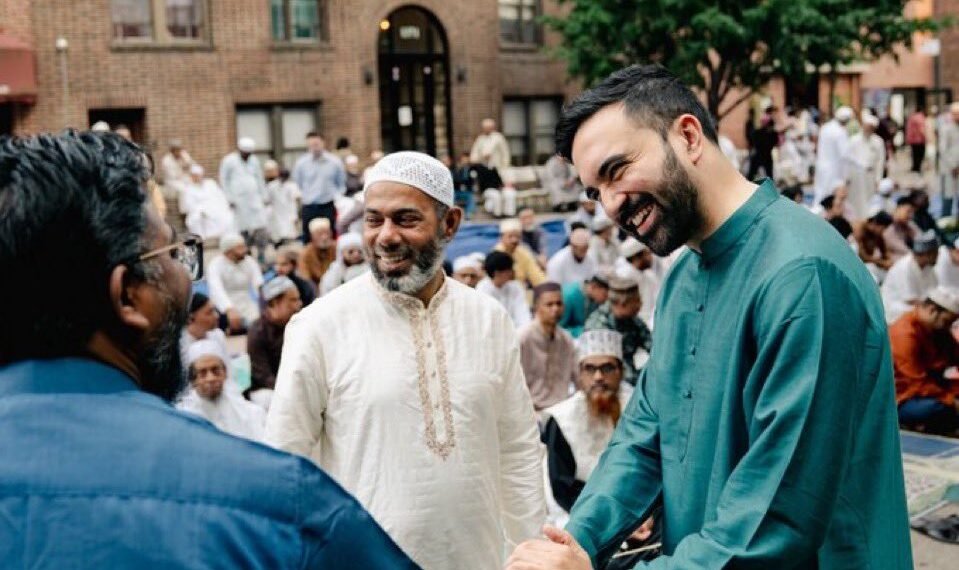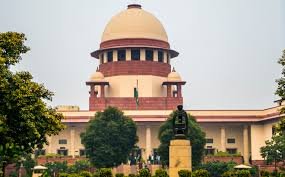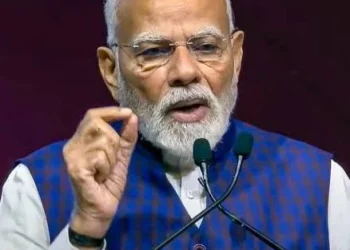For many, the 34-year-old’s rise marks a moral and ideological pushback against the global tide of right-wing populism, challenging the dominance of Trumpian and Hindutva narratives alike.
BY PC Bureau
November 5, 2025: When 34-year-old Zohran Kwame Mamdani — born to Indian filmmaker Mira Nair and Ugandan scholar Mahmood Mamdani — won the New York City mayoral race on November 4, 2025, it was far more than a local upset. It was a seismic moment of global symbolism — one that reverberated from Queens to Kampala to New Delhi, especially on a U.S. election night marked by Democratic gains in key races despite Donald Trump’s presidential victory.
Mamdani, a Democratic Socialist, became New York’s first Muslim, African-born, and South Asian heritage mayor — an ideological counterpoint to the surging tide of right-wing nationalism, both in Trump’s America and Modi’s India. With over a million votes and the city’s highest turnout since 1969, his victory over Andrew Cuomo and Curtis Sliwa underscored a powerful voter hunger for affordability-focused policies like free childcare, fare-free buses, rent freezes, and massive public housing construction — crushing campaigns backed by Wall Street and even a last-minute Trump endorsement.
For India’s political observers, Mamdani’s ascent is more than a family triumph for Mira Nair — the celebrated director of Monsoon Wedding and Salaam Bombay! — it’s a symbolic defeat for the global right, which has long dismissed pluralism, socialism, and secularism as “elitist” or “anti-national.” His win, projected swiftly by major U.S. networks, sparked celebrations among Muslim Americans and progressives worldwide, with his supporters in Astoria chanting, “Hope is still alive.”
READ: Crisis in NSCN (I-M): Muivah Battles Rebellion Within the Ranks
An Indian Son, A Global Message
Mamdani’s victory speech — “New Yorkers have said yes to a city that works for the many, not the moneyed few” — resonated deeply across the Global South. Its echoes can be heard in India’s farmers’ protests, students’ movements, and workers’ struggles for equity.
He represents a new diasporic Indian identity: unapologetically leftist, anti-imperialist, and unafraid to critique both American and Indian inequalities. In a diaspora often celebrated for producing CEOs and billionaires, Mamdani’s rise marks a striking counter-narrative — that of an Indian-origin leader challenging the system rather than thriving within it.
As one supporter said, “It’s not about his religion or ethnicity — it’s his laser-focused message of affordability.”
Why It’s a Setback for India’s Right
For India’s right-wing establishment, which has cultivated ideological kinship with Trumpian conservatism, Mamdani’s victory is a direct ideological rebuke. It challenges the notion that Hindu nationalism and American populism represent the inevitable future of global politics.
Trump’s attempt to label Mamdani a “communist” — and the corporate push to derail him — only backfired spectacularly. In contrast, Mamdani’s triumph shows that solidarity, empathy, and grassroots organizing can still defeat big money and hate politics.
Reclaiming the Moral Narrative
Mamdani’s politics — grounded in equity, empathy, and secularism — revives ideals that the Indian right has worked to marginalize. His victory asserts that these values are not elitist, but essential to democracy’s survival.
At a time when Islamophobia dominates Indian discourse, the election of a Muslim mayor in America’s largest city holds immense moral weight. It demonstrates that democracy, at its best, still has room for minority leadership — something India’s opposition has struggled to achieve.
From post-9/11 suspicion to today’s celebration, Mamdani’s story is a reminder that inclusion remains possible — even amid global polarization.
Mamdani redefines what it means to be part of the Indian diaspora. No longer just a symbol of economic success or political moderation, he embodies a progressive globalism — one that links climate justice, labor rights, and anti-racist solidarity across borders.
In contrast to sections of the diaspora aligned with Hindutva politics, Mamdani’s win signals a diaspora of dissent — loud, plural, and proudly socialist.
A Blow to Global Right-Wing Alliances
For nearly a decade, the BJP and the global right have drawn energy from a shared narrative: “Make America Great Again” meets “New India.”
But with Mamdani’s rise — in Trump’s own hometown — that axis appears fractured. Trump may control Washington, but New York has chosen a socialist of Indian descent. The symbolism is profound: two leaders, two ideologies, two Americas — and two Indias — colliding in one historic moment.
As the Republican National Committee fumed, “Democrats have handed New York City over to a self-proclaimed communist.” The irony was lost on them: the people had chosen community over capital.
Indian Reactions: Inspiration and Silence
India’s right-wing media reacted with wary restraint. Liberal outlets hailed Mamdani’s win as a “diasporic milestone,” but pro-establishment networks largely ignored it, uneasy with his support for Palestine and his criticism of Modi’s India.
For India’s youth, especially in universities and activist spaces, Mamdani is already a “global comrade.” His campaign line — “A city for the many, not the moneyed few” — now circulates on Indian social media as a rallying cry against crony capitalism and communal politics.
Zohran Mamdani, a Muslim immigrant wins New York’s mayoral election!
He calls himself a Democratic Socialist, and favours free buses, free childcare & freeze on rents in NY.
He defeats big money & Trump who called him a communist & ganged up to defeat him.
His win has many…— Prashant Bhushan (@pbhushan1) November 5, 2025
A Mirror to India’s Democratic Soul
Mamdani’s rise poses a powerful question:
Could a Muslim, socialist, anti-establishment leader win a major election in today’s India?
His victory underscores what India risks losing — the pluralism, empathy, and dissent that once defined its democracy. As Bhushan noted, “Voters reward those who challenge the establishment honestly.” Mamdani’s triumph, then, is both an inspiration and an indictment for India.
VIDEO | Zohran Mamdani (@ZohranKMamdani) was elected mayor of New York City on Tuesday, capping a stunning ascent for the 34-year-old state lawmaker, who becomes the city’s most liberal mayor in generations.
In a victory for the Democratic party’s progressive wing, Mamdani… pic.twitter.com/opfiPGL82R
— Press Trust of India (@PTI_News) November 5, 2025
The Broader Message: A Global Left Resurgent
As Trump returns to the White House and right-wing forces dominate Europe and South Asia, Mamdani’s victory is a flare of resistance. It shows that the global left is not extinct, but rebirthing itself through grassroots organizing, moral clarity, and youth-driven energy.
Despite billionaire-funded PACs pouring over $40 million to stop him, Mamdani turned their attacks into fuel for his cause. His success proves that socialism, far from dead, is evolving — from ideology to lived experience, rooted in local struggles for housing, dignity, and equality.
If the Indian right expected Trump’s second term to consolidate global conservatism, Mamdani’s victory — and the solidarity it inspired from New York to New Delhi — offers a sobering reminder:
The fight for justice has gone global again, and its new heroes may not come from Delhi or Washington, but from Queens.














